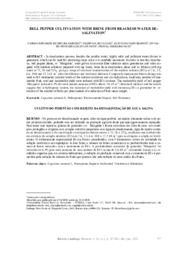Bell pepper cultivation with brine from brackish water desalination.
Bell pepper cultivation with brine from brackish water desalination.
Author(s): ARRUDA, C. E. de M.; DIAS, N. da S.; BLANCO, F. F.; SOUSA NETO, O. N. de; FERREIRA NETO, M.
Summary: In desalination process, besides the potable water, highly salty and pollutant water (brine) is generated, which can be used for producing crops since it is carefully monitored. In order to test this hypothesis, bell pepper plants, cv. 'Margarita', were grown in coconut fiber substrate under greenhouse and were irrigated with nutrient solutions prepared with tap water, brine from desalination plant, and its dilution with tap water at 75, 50 and 25%, giving a range of electrical conductivities of the nutrient solution (ECs) of 2.6, 3.1, 6.6, 10.0 and 12.2 dS m-1 after the dilutions and fertilizers addition. Completely randomized blocks design was used with 5 treatments (salinity levels of the nutrient solutions) and six replications. Leaf area, number of marketable fruit, total and marketable yield were reduced with ECs increase. The marketable yield of bell pepper 'Margarita' reduced 6.3% for each unitary increase of ECs above 2.6 dS m-1 (threshold salinity) and the results suggest that in hydroponic system, the reduction of marketable yield with increasing ECs is promoted by reduction of the number of fruits per plant instead of a reduction of fruit mean weight.
Publication year: 2011
Types of publication: Journal article
Unit: Embrapa Mid-North
Observation
Some of Embrapa's publications are published as ePub files. To read them, use or download one of the following free software options to your computer or mobile device. Android: Google Play Books; IOS: iBooks; Windows and Linux: Calibre.
Access other publications
Access the Agricultural Research Database (BDPA) to consult Embrapa's full library collection and records.
Visit Embrapa Bookstore to purchase books and other publications sold by Embrapa.

